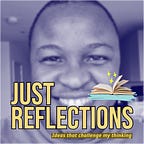Many of us believe luck to be a binary non-deterministic thing; by no doing of our own, there are people who are lucky and other people who are not lucky. In another variation, we believe people’s luck to be situational; for example, when it comes to business, she’s very lucky.
What if I told you that none of that is true? That there are things you can do to create your own luck.
This is an idea that occupies my mind a lot, but it’s not my idea. There are many smart people who have learnt to get the winds of luck to blow more strongly on their sails. This isn’t something mystical that’s accessible only to a few who’ve unlocked some higher plane of existence. There are things we can all do to increase our luck. Let’s take a closer look.
Increasing the surface area for luck
Before you come at me and say this is a little too airy-fairy. Let me clear the air. I believe that there are no inherently lucky or unlucky people. I also believe that luck happens by chance. After all, the Bible says:
“I have seen something else under the sun: The race is not to the swift or the battle to the strong, nor does food come to the wise or wealth to the brilliant or favor to the learned; but time and chance happen to them all.” — Ecclesiastes 9:11, NIV.
Not everything comes by hard work or training or strength or intelligence. Sometimes things happen despite all this. There are hard-working, intelligent and wealthy people who have rotten things happen to them and there are rotten people who have good things happen to them.
This thought can comfort us in our ineptitude. If it’s all just random, then your lack of success is not your fault. We’re just continuously being dealt a bad hand. Right? Wrong!
Here’s the point I want to make here. You can take calculated action to create optimal conditions for good fortune to land on you more often. Put another way, while luck falls randomly, you can do things to increase your surface area for catching it. Here’s a cool diagram I adapted from Shawn Wang’s article on How To Create Luck.
Here’s how to do it.
How to get lucky
I’ve read many interesting strategies for how to increase luck. But I think they are all summed up really well by Naval—who has the most legendary Twitter account with 1.8 million followers and following 0. According to Naval, there are four ways to get lucky:
• Hope luck finds you.
• Hustle until you stumble into it.
• Prepare the mind and be sensitive to chances others miss.
• Become the best at what you do. Refine what you do until this is true. Opportunity will seek you out. Luck becomes your destiny.
Let’s expand on these.
Hope that luck finds you
Hopefully, it’s obvious that this is the least optimal strategy. And yet, this is the strategy that most of us employ. We believe that luck is completely out of our control. We have no agency in its acquisition. So we sit still and hope that it lands on us. When we do this, we do nothing about the probabilities. This leaves us at the mercy of random chance. You’re lucky or you’re not. You’re fortunate to have certain privileges or you’re not. In Shawn Wang’s words, you have the same luck as a plant which has no agency in its success. Avoid this strategy!
Hustle until you stumble into it
This is the luck that you attract by trying many times. You’re more likely to roll a six if you roll the dice many times.
We attract this kind of luck by taking many risks. As kids, we did this a lot. We have to if we’re going to learn how to walk or talk. That’s how we moved from being someone who can’t ride a bike to one who can. And that’s how we made many friends. We actively got out of our comfort zones and took some risks. But as we get older, the tendency is to lock onto a certain definition of who we are and stop trying new things outside our comfort zone that could stretch us beyond the boundaries of that definition. And by so doing, we narrow our surface area for catching luck.
Richard Wiseman suggests three ways we can use to maximise our change opportunities that fit into this category: Have a large network of people who can alert you to new opportunities, be more relaxed and easygoing so that you can spot the opportunities when they arise, and be open to new opportunities. If you only talk to the same people, do the same things and maintain a straight jacket personality week in, and week out, your chances of stumbling upon luck are going to stay limited.
So here’s an idea; continuously push yourself to stretch beyond the boundaries of who you’ve defined yourself to be. Take an intellectual risk by tackling a fresh problem you haven’t tried before or a social risk by talking to the stranger next to you the next time you’re on the train. Take an emotional risk; tell someone you really care about how you feel. Luck results from a series of minor risks that get you out of your comfort zone and expose you to new situations that wouldn’t happen when you’re just waiting around.
But luck is not just about risks. Good luck also requires effort. There are some people who take many risks but don't follow through with effort. They start many high potential things, but those things never come to anything meaningful. There are also people who put a lot of effort into what they’re already comfortable with but take no risks, so they excel in their small limited context, hit the ceiling fast and get nowhere else. To maximise the surface area for good luck, you need both.
Talk to strangers and be sincerely curious about them. Try new activities that are out of the norm for you. Do this often and your wide sails will eventually catch the winds of luck.
Be sensitive to the luck that others miss
You’ve probably heard Seneca’s popular saying that luck is opportunity meeting preparedness. This is the luck you get from noticing that something lucky has happened that most would miss.
There are opportunities for luck dropping all around us. Unfortunately, most of the time we’re not well positioned to notice them or to take advantage of them. In illustrating this, Shawn Wang gives this illustration;
“The canonical story on this is Alexander Fleming’s discovery of penicillin, which was a huge medical breakthrough. The discovery was a total accident (some mold happened to fall in the right spot + Fleming happened to see it + he had a similar experience that was a nonevent 9 years ago), but Fleming was not only “uniquely equipped to observe it” by his background, he took action to confirm the observation.” — Shawn Wang
Most people judge ideas as good and bad, but ideas are neither of that. When viewed with the correct perspective, a seemingly useless idea can yield some incredible insight into a seemingly disparate discipline. The best advice I’ve heard for capturing this kind of luck is credited to Richard Feynman by Gian-Carlo Rota.
“Richard Feynman was fond of giving the following advice on how to be a genius. You have to keep a dozen of your favorite problems constantly present in your mind, although by and large they will lay in a dormant state. Every time you hear or read a new trick or a new result, test it against each of your twelve problems to see whether it helps. Every once in a while there will be a hit, and people will say: “How did he do it? He must be a genius!” - Gian-Carlo Rota, Indiscrete Thoughts.
According to Richard Wiseman, when people who consider themselves lucky encounter misfortune, they turn that bad luck into good by trying to see things in the most positive light. The glass half full effect. In addition, when things go poorly, they want to know why so that they can change things for next time. They genuinely look for feedback on how to be better and then incorporate that feedback into their lives. In this way, they develop a sense for seeing opportunity even in their own misfortune.
Let luck find you
There are forms of luck accessible to everyone, and then there are forms that are accessible to people in unique situations. Naval probably illustrates it best with this example:
“…let’s say you’re the best person in the world at deep-sea diving. You’re known to take on deep-sea dives nobody else will even dare to attempt. By sheer luck, somebody finds a sunken treasure ship off the coast they can’t get to. Well, their luck just became your luck, because they’re going to come to you to get to the treasure, and you’re going to get paid for it.” — Naval Ravikant.
The person who found the treasure had blind luck; it just happened to them. Them coming to you to extract it and give you half is not blind luck. There’s a very specific reason they came to you and not to anyone else. You created your luck. By working to become the best at what you do, you put yourself in a position where luck comes looking for you.
You might ask, “but in this case, is it still luck?” And that is exactly the point. It’s possible to excel so much that luck in that specific area seems deterministic. Which makes it hard to even define as luck.
The idea here is to find something you really enjoy and that you’re great at and double down on it. Do it very well and build a name around it so that anyone who needs help in that specific area will think of you first and thus come to share their luck with you.
“If you are a trusted, reliable, high-integrity, long-term-thinking dealmaker, when other people want to do deals but don’t know how to do them in a trustworthy manner with strangers, they will literally approach you and give you a cut of the deal just because of the integrity and reputation you’ve built up.” — Naval Ravikant.
Conclusion
Talking about creating luck is a bit of an odd thing. This is mostly because it seems attracting luck comes down to a paradox, you must believe that you have agency in generating success and it comes through diligence and hard work. But you must also understand that a big part of your success is because of circumstances outside of your control. You happened to be at the right place at the right time with the right knowledge and the right questions and all that came together to help you catch the opportunity. So while you can’t control which opportunities will come, there’s something you can do about all the other stuff.
Finally, whether you use the model we just went through or another from the many books written on the subject. It’s pretty well proven that you can influence how lucky you are. So go out there armed with this knowledge and tip the odds in your favour.
Good luck!
Related readings;
The Luck Factor: The Scientific Study of the Lucky Mind by Richard Wiseman
How To Create Luck by Shawn Wang
How To Get Lucky from the Almanack of Naval Ravikant












